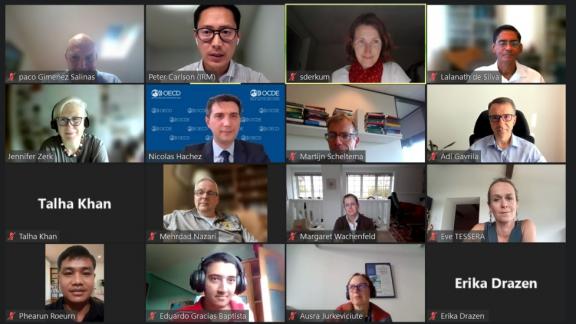Advancing accountability and equitable outcomes: Insights from the 10th GRAM webinar on the latest OECD Guidelines on Responsible Business Conduct
Institutionalised grievance mechanisms and comprehensive policy are essential for achieving equitable outcomes and accountability across sectors. Through its Guidelines for Multinational Enterprises on Responsible Business Conduct ("The Guidelines"), the OECD works to promote good business practices, sustainable development, and transparency in its member states and beyond. To discuss the latest updates to The Guidelines, the OECD Center for Responsible Business Conduct co-hosted the 10th webinar of the Grievance Redress and Accountability Mechanism (GRAM) partnership on 10 October 2023, in collaboration with the IRM. Peter Carlson, Communication Officer of the IRM, served as the moderator for the event.
Nicolas Hachez, Head of Access to Remedy at the OECD Centre for Responsible Business Conduct, was the primary speaker at the event. During his presentation, Nicolas elaborated on changes made to The Guidelines that serve to streamline the role of National Contact Points (NCPs) and respective accountability policy across member and affiliated states. NCPs are tasked with promoting, monitoring, and enforcing the observance of The Guidelines by entities based or conducting considerable operations in member-states. The new updates introduced criteria to gauge the effectiveness of the NCPs, called for increased resources and attention to this initiative, more active engagement of external stakeholders, strategies to better enforce The Guidelines, and mandatory internal peer reviews of NCPs. Nicolas also explained that the updated Guidelines also clarify the authority and expectations for NCPs to serve as accountability mechanisms for violations of The Guidelines, and emphasised the special attention paid to increasing transparency and protecting complainants from reprisal.

The first speaker for the panel discussion was Jennifer Zerk, a Legal Consultant with the OHCHR Accountability and Remedy Project. She discussed her thoughts on the new additions to the Guidelines, focusing primarily on the areas of stakeholder engagement and protection from reprisals. Drawing from her own work with the OHCHR, Jennifer explained that policy formulation that includes and engages external stakeholders is much stronger than those drafted solely by the issuing entity in isolation. Jennifer also touched on the need for the inclusion of nuanced reprisal protections for complainants, noting that grievance mechanisms may not always be knowledgeable of all cultural-context-specific forms of reprisal that can materialise.
The other panel discussant was Martijn Scheltema, the Founder of the Erasmus Platform on Sustainable Business and Human Rights. Martijn echoed points made by Jennifer and highlighted the improvements on cooperation with other non-judicial accountability mechanisms. Martijn also praised the new Guidelines' clarification on procedures to avoid parallel proceedings when multiple NCPs or entities are involved. He expanded on this to stress the importance of forming relationships with other accountability mechanisms, particularly local mechanisms, to achieve better outcomes. Given that NCPs' investigative work and conclusions lack legally binding powers, cooperation and recommendations to local judicial entities may be an effective way to improve outcomes for those affected by violations of The Guidelines and increase the credibility of this initiative.
The webinar concluded with time for Nicolas to respond to comments made by Jennifer and Martijn and field additional questions and statements from the audience.
